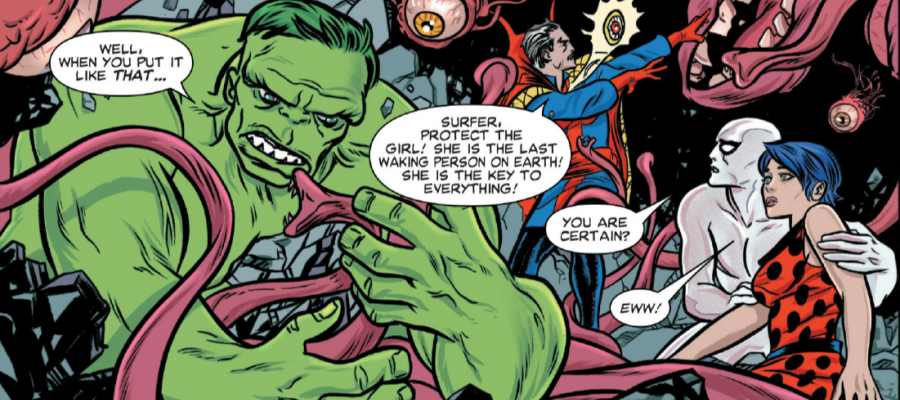Philosophy and the Superhero
Apr 12, 2020Philosophy is replete with thought experiments featuring characters like Descartes’ “Evil Genius” and Davidson’s “Swampman.

Can comic books reveal deep truths about human nature? What can Marvel’s Miracleman teach us about metaphysics? Should we be learning about ethics from Batman and Superman? On this week’s show, we’ll be talking with Nathaniel Goldberg about what philosophers can learn from superhero comics.
One thing comics can do is to set up vivid thought experiments. Some thought experiments from philosophy texts already sound like they’re straight out of comic books. Rene Descartes imagines that his perceptions are controlled by an evil genius—a premise that also shows up in Alan Moore’s Miracleman series! Donald Davidson imagines a creature called Swampman, who could be a cousin of Moore’s Swamp Thing. (Moore’s Swamp Thing is created from an ordinary man named Alec Holland when villains effect an unwanted transformation on his body, while Davidson’s Swampman is an exact replica of Davidson himself, who springs into existence when a lightning strike rearranges the molecules of a dead tree.)
These philosophical thought experiments might seem far-fetched, but they’re meant to tell us something about the real world. Descartes’ evil genius is meant to raise problems for our knowledge of everyday truths. (If I can’t definitively rule out the possibility that an evil genius is fooling me into thinking that the sky is blue, even though the sky is red, do I really know that the sky is blue?) And Davidson’s Swampman is meant to help us think through the nature of belief, desire, and other mental states. (Can you have a desire for potato chips if you’ve never encountered a potato chip, or a potato, or a physical object? Davidson thinks not—and he concludes that Swampman has no mental states at all.)
But comic-book thought experiments differ from philosophy thought experiments. They don’t aim at convincing the reader of anything; instead they’re sustained imaginative exercises that involve both visual imagination and narrative, and that readers engage for fun rather than for the purposes of inquiry. This special nature strikes me as both a strength and a weakness.
On one hand, thinking through imaginary scenarios just because they’re interesting—without any particular philosophical goal in mind—seems like a good method for drawing out the consequences of their starting assumptions in a detailed, unbiased way. The extra details of storytelling and visual illustration engage the reader’s emotional capacities, which can provide an important means of understanding possibilities, of distinguishing important from unimportant information.
On the other hand, comic books aren’t really designed to aim at philosophical truths, and if you’re looking to draw philosophical conclusions, the extra details are irrelevant at best, and distracting or misleading at worst. Reading about Superman’s evil twin, Bizarro, is certainly entertaining… but does it really tell us anything about the nature of morality? Bizarro follows the “Bizarro Code”: “Us Do opposite of Earthly things! Us hate beauty! Us loves ugliness! Is big crime to make anything perfect on Bizarro World!” You might worry that Bizarro World is not even coherently conceivable (do the citizens of Bizarro world really count as having a concept of ugliness, if the things they call “ugly” are things they love and admire?), and that trying to entertain something so incoherent is as likely to lead to confused and mistaken conclusions.
More collaborations between philosophers and comic book artists could help build on the strengths of both disciplines. I know of a few philosophy-and-comics crossovers, like Existential Comics, or Helen De Cruz’s illustrations of philosophical thought experiments. Logicomics is a graphic novel about the history of philosophy. And Nathaniel’s book, Superhero Thought Experiments, is co-authored by Chris Galver from Comic Studies. I’m hoping to see more collaboration and crossovers in the future.
I’m also excited to bring the conversation about superheroes and philosophy to you, now that we’ve figured out how to broadcast from our respective shelters-in-place. Please tune in for our conversation with Nathaniel!
Comments (1)
Tommy2020
Friday, April 17, 2020 -- 9:39 AM
Hi,Professor Ray.Hi,Professor Ray.
I like philosophy and Superheroes so much.
So, I like to think what is Superhero in philosophical sense. So,I have had a question since reading Watchmen and papers about Superheroes written by Professor Chris Gavaler.
In short, Are Superheroes inherently fascist and is Superheroes genre about fascism?
Indeed, as Moore pointed out in Watchmen, Superheroes enforce their morality on criminals through violence. It meets the definition about fascism as fascism often accomplish their political agenda through violence. Might makes right seems to be the core of fascism.
On the other hand, Superheroes appreciate humanity. They are often the gurdian of the current society. They neither rule people nor enforce their own morality on the society. In this sense, Superheroes lack definition of the fascism
So, I can't tell whether Superheroes should be called fascist or not.
So,I want you to know how professional philosophers think about Superheroes. Please teach me about how you see Superheroes.